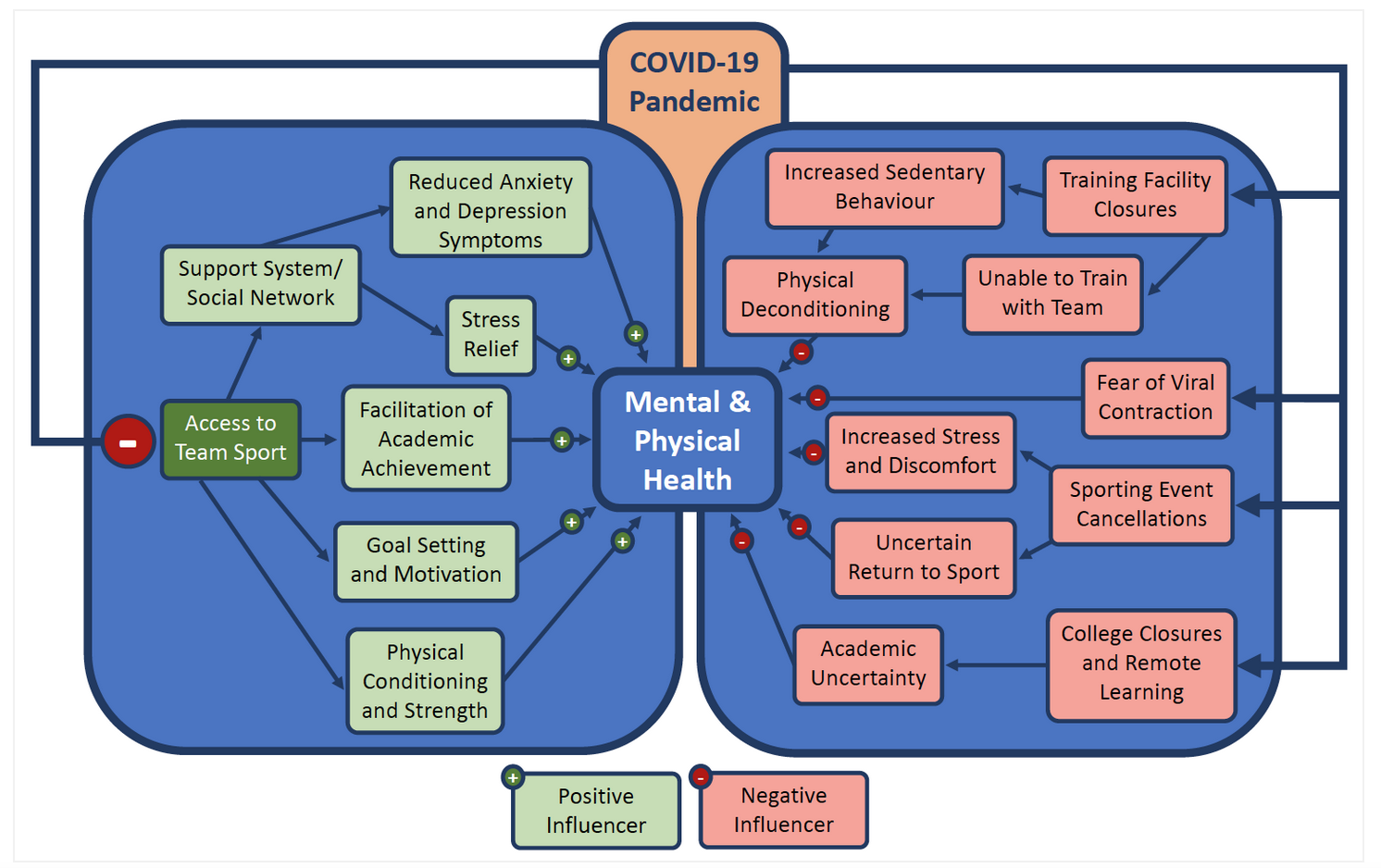Have we forgotten about student-athletes’ mental health?
Retrieved June 13, 2021 British Journal of Sports Medicine (March 18,2021)
Since the onset of the COVID-19 pandemic, competitive athletes have expressed substantial grief and frustration attributed to alterations in routine, limited or modified training, and the postponement of international competitions, such as the Tokyo 2020 Summer Olympics and international championship events [1,2]. The additional strain from the removal of team support networks, which are often crucial components for stress management [1], can result in significant mental and physical health consequences including low mood, sleep disruption, worsening diet, and deconditioning.
The lack of attention and research on the unique mental health needs of student-athletes during the COVID-19 pandemic has led to a limited response from sporting organizations and academic institutions in addressing athlete-specific concerns. To date, majority of research has focused on the college student population, who may already exhibit high levels of psychological distress in non-pandemic settings. Studies investigating the psychological pressures facing students as a result of the pandemic have confirmed their susceptibility to worsening mental health. A Chinese study of 7,143 college students identified the presence of mild to severe anxiety in a quarter of their sample, noting that the severity of anxiety symptoms were positively correlated to academic delays, economic effects, and impacts on daily life [5]. Among another sample of 66 students, a high prevalence (85%) of pandemic-related worries and increases in global negative emotions including stress and anxiety were noted. Importantly, the authors concluded that physical activity directly alleviated these general negative emotions [6]. Similar relationships between mental health and physical activity have also been reproduced from United States student cohort, where large disruptions in exercise were shown to be a leading risk factor for depression during the pandemic. These findings have particular implications for student athletes given their reliance on exercise, training, and competition for stress management and mental well-being. In fact, a recent study investigated the impact of the COVID-19 lockdown on young student-athletes in Spain, noting a general negative impact of COVID-19 on their mental health. Those most at-risk were female athletes of lower socioeconomic status, who also reported a more demanding academic load and worse training conditions than other athletes.
Are student-athletes an at-risk population for negative mental health outcomes during the pandemic?
For most student-athletes, sport and physical activity go hand-in-hand with achieving goals in academic settings. As an example, student participation in organized sport has been associated with academic success, in comparison to non-athlete students [9]. Participation in sport is also associated with psychological benefits, including heightened happiness, stress relief, and the reduction of depression and anxiety risk [9]. With the removal of intercollegiate sport due to COVID-19 restrictions, many student-athletes may feel bereft of this much needed outlet, which is a major component of their personal and athletic identities. In addition to the direct impacts that the COVID-19 pandemic places on student-athletes, their mental and physical health may also be affected indirectly through the severing of many positive influencers that accompany access to team sport (Figure 1).
Figure 1. Psychosocial Difficulties Facing Student-Athletes During the COVID-19 Pandemic. The COVID-19 pandemic has both direct and indirect effects that contribute to the overall health and mental well-being of student-athletes. In addition to severing the numerous positive influences on student-athlete mental and physical health (as a result of access to team sport), the COVID-19 pandemic has also led to downstream effects that negatively impact the psychosocial well-being of this population.

Figure 1. Psychosocial Difficulties Facing Student-Athletes During the COVID-19 Pandemic. The COVID-19 pandemic has both direct and indirect effects that contribute to the overall health and mental well-being of student-athletes. In addition to severing the numerous positive influences on student-athlete mental and physical health (as a result of access to team sport), the COVID-19 pandemic has also led to downstream effects that negatively impact the psychosocial well-being of this population.
How should student-athlete mental health concerns be addressed?
Recognizing the timely call for solutions aimed at reducing the impact of COVID-19 on student mental health [4], it is incumbent upon sporting organizations and academic institutions to provide unique support to their student-athlete population. Previous interventions have shown promising results in addressing student-athlete mental health in non-pandemic settings. Shannon et al. (2019) demonstrated the utility of a home-directed mindfulness program in producing positive changes to mental well-being, resulting from increased athlete competency of mental health self-management, increased mindfulness awareness, and decreased stress, in sequence [10]. Partnership with mental health care providers to provide appropriate psychoeducational material to teams (i.e. alternative coping strategies that focus on healthy and adaptive ways to deal with academic stress) and model the importance of self-care should be encouraged. Efforts must be aligned to reduce the stigma associated with student-athlete mental health concerns, which can make some athletes reluctant to seek care due to fear of negative perceptions from their peers [11]. Considering a more actionable plan, the emergence of novel athletic social media platforms, such as Zwift, Strava, or Sportstats, can be utilized by intercollegiate sporting organizations to host virtual competitions and sport series, effectively fulfilling the stark gap in competition faced by student-athletes.
Take-home messages
- The multiple impacts of the COVID-19 pandemic on student-athlete populations should not go unnoticed or unaddressed, and research on psychological outcomes within these populations is warranted.
- Developing evidence-informed support programs for student-athletes is critical, particularly considering cancellations of major leagues, tournaments, competitive events, and seasons across the globe.
- There is an imminent need to understand how academic institutions, sporting organizations, and healthcare systems can collaborate in their response to the COVID-19 crisis, so that negative psychological outcomes can be mitigated, and athletes can return to play.


